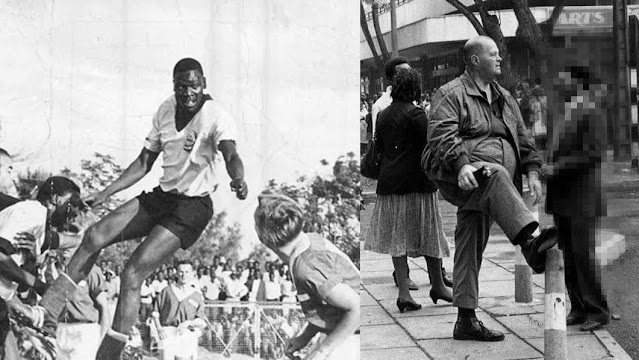Search This Blog
"Truth comes only to conquer those who have lost the art of receiving it as a friend." ~ Ravi Thakur
Featured
- Get link
- X
- Other Apps
The Dual Life of Football Prodigy Nicodemus Arudhi: A Tale of Sporting Glory and Underworld Intrigue
 |
| What What did football prodigy Nicodemus Arudhi and the man known as "Romeo 9" have in common? |
In the annals of African football history, certain names shimmer with the iridescence of legend. Among these luminaries, Nicodemus Arudhi stands out, not merely for his mesmerising skills on the pitch, but for the enigmatic dichotomy that defined his existence—a tale of two lives intertwined in a complex web of sporting glory and underworld intrigue.
Arudhi's ascent to footballing stardom was meteoric, his lightning-fast strikes and unrivalled agility earning him accolades on both the national and international stage. From his early days with Luo Union to his epoch-defining tenure with Gor Mahia, Arudhi dazzled spectators with a virtuosity reminiscent of the great Joe Kadenge himself.
Yet, behind the veil of sporting brilliance lurked a shadowy underworld persona, concealed beneath layers of aliases and clandestine activities.
By night, Arudhi shed his footballing façade to embrace a life of crime, weaving through the labyrinthine alleys of Nairobi's underworld with the finesse of a seasoned hustler.His criminal exploits, shrouded in mystery and myth, cast a pall of intrigue over his illustrious footballing career. From petty theft to more nefarious deeds, Arudhi's rap sheet bore witness to a life lived on the razor's edge, where every goal scored on the pitch was offset by a transgression committed under the cloak of darkness.
The nexus between Arudhi's dual identities was a tenuous one, fraught with peril and punctuated by brushes with law enforcement. Yet, amidst the chaos and uncertainty, he maintained a delicate balance, his uncanny ability to elude capture mirroring his evasive manoeuvres on the football field.
However, fate is a fickle mistress, and Arudhi's luck eventually ran out on a fateful night in June 1981.
Cut down by the bullet of Patrick Shaw, a notorious police reservist with a penchant for extrajudicial killings who himself led a double life, Arudhi met his untimely demise, leaving behind a legacy as complex as the man himself.In retrospect, Arudhi's story serves as a cautionary tale, a sobering reminder of the fragility of fame and the perils of leading a double life. Yet, amidst the shadows of his murky past, his brilliance on the football pitch remains undimmed, a testament to the enduring power of talent and tenacity.
As the sun set on Nicodemus Arudhi's tumultuous saga, many could not help but marvel at the indelible mark he left on the annals of African football—a legacy etched in equal parts of triumph and tragedy, of glory and infamy.
- Get link
- X
- Other Apps
Popular Posts

The One On Why Uganda Produces Shitty Ads
- Get link
- X
- Other Apps

Of Australian Bogans Masquerading As Creatives In Nairobi Agencies
- Get link
- X
- Other Apps


Comments
Post a Comment